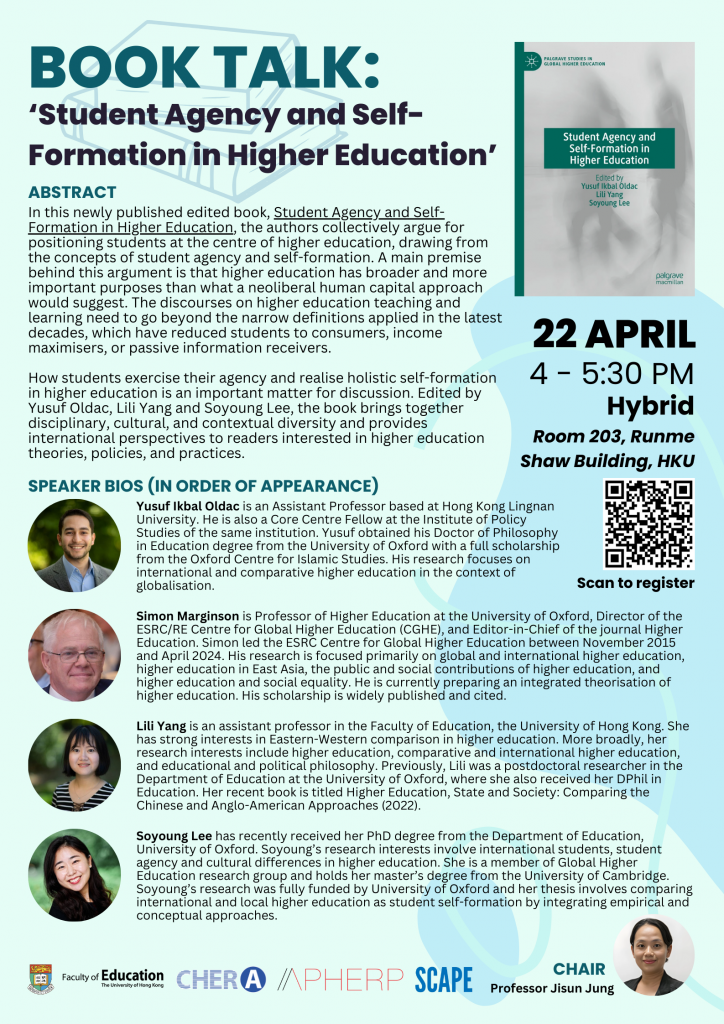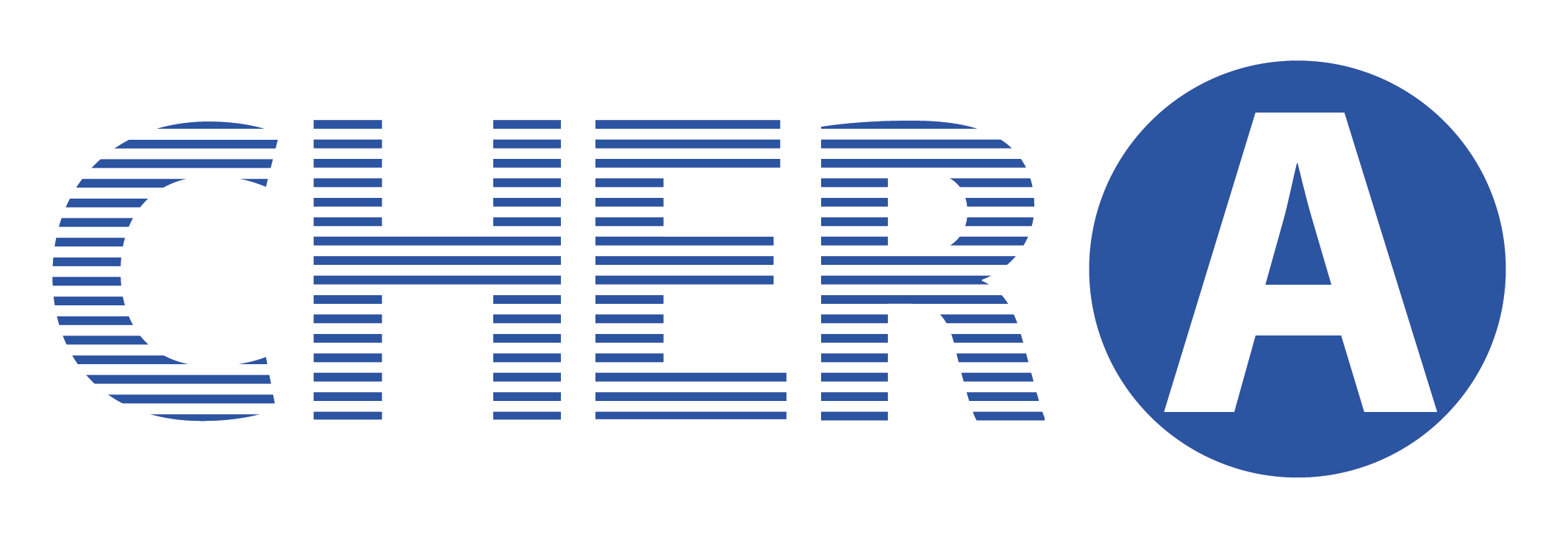
Time: 4:00pm-5:30pm, (HKT)
Date: 22 April, 2024
Venue: Runme Shaw Building 203 & by zoom
Speaker: Prof. Yusuf Ikbal Oldac (Hong Kong Lingnan University), Prof. Simon Marginson (University of Oxford), Prof. Lili Yang (The University of Hong Kong), Dr. Soyoung Lee (University of Oxford)
Chair: Prof. Jisun Jung (The University of Hong Kong)
Registration link: https://hku.au1.qualtrics.com/jfe/form/SV_0NcMaZwQNv8NKhU
Abstract:
In this newly published edited book, Student Agency and Self-Formation in Higher Education, the authors collectively argue for positioning students at the centre of higher education, drawing from the concepts of student agency and self-formation. A main premise behind this argument is that higher education has broader and more important purposes than what a neoliberal human capital approach would suggest. The discourses on higher education teaching and learning need to go beyond the narrow definitions applied in the latest decades, which have reduced students to consumers, income maximisers, or passive information receivers.
How students exercise their agency and realise holistic self-formation in higher education is an important matter for discussion. Edited by Yusuf Oldac, Lili Yang and Soyoung Lee, the book brings together disciplinary, cultural, and contextual diversity and provides international perspectives to readers interested in higher education theories, policies, and practices.
In this webinar, Yusuf Oldac will introduce the book, its overall arguments and its chapters. Afterwards, two of the chapters from the book will be presented and discussed. A Q&A session will follow. The two chapters and their abstracts are as follows.
Simon Marginson will discuss his chapter titled ‘Antecedents of Student Self-Formation in Social Theory and Educational Philosophy: What Do They Tell Us About Structure and Agency?’.
One of the main functions of higher education is ‘subjectification’, the process whereby students emerge as self-determining persons. The contemporary form of subjectification can be understood as the ‘self-formation’ of students. Student self-formation is sustained by, and develops, the will to learn and an epistemically engaged student agency that is autonomous and reflexive. Student self-formation is foregrounded in contemporary societies that rest on socially nested autopoietic individuality. It also has partial antecedents in the educational practices of Confucian self-cultivation in the Chinese civilisational zone, the Greek and Roman work of the self on the self, the Bildung tradition in Germany, and the American pragmatism of John Dewey and others. More contemporary antecedents in political theory, sociology and psychology include Lev Vygotsky, Amartya Sen, Anthony Giddens, Margaret Archer and Michel Foucault. These partly contrary theorisations differ in their ideas of structure and agency and hence the space they make for the self-evolution of students. The chapter reviews these differing partial antecedents. It finds that research on student self-formation is best informed by theorisations in which agency is interactive with structure, but also autonomous and ontologically heterogeneous in relation to structure (e.g. Archer and Foucault), rather than patterned by structure within a structure/agency unity (e.g. Giddens). Focus on agency does not block awareness of the power of structural forces: structure and agency are sometimes but not always in a zero-sum relationship. Unequal student starting points, unequal learning resources, and unequal institutional and policy commitments to subjectification, sharply differentiate the conditions of self-formation. Yet in the face of structural inequalities, it is always self-forming agency that offers the way through.
Lili Yang and Soyoung Lee will introduce their collaborative chapter co-authored with Yusuf Oldac titled ‘Agency and Student Development in Higher Education: A Cross-Cultural and Cross-Disciplinary Exploration’.
Students experience development and growth during their higher education journey, but the exact mechanisms behind this process remain relatively unknown. This chapter seeks to shed light on how students develop, grow, and attain empowerment in higher education by focusing on the interactions between individuals and their surroundings (referred to as I-world interactions). Employing a multicultural and multidisciplinary approach, the chapter begins by examining various cultural and philosophical perspectives on I-world interactions, such as the German idealistic, Chinese Confucian, and Islamic Sunni philosophies. Subsequently, it delves into the implications of these interactions for individual development and growth in higher education, drawing from research in psychology, sociology, and education. The chapter argues that three fundamental elements underlie I-world interactions in all three philosophical approaches: the acknowledgement of agency, exercise of agency and enhancement of agency. Higher education allows students to exhibit agency, as supported by sociological theories and psychological evidence of human functioning. Students actively exercise their agency, especially when engaging with environmental factors both within and outside the university setting. If universities effectively structure and implement this process, they can contribute to the enhancement of students’ agency. The three shared elements among the examined cultural philosophies and the empirical evidence in educational, psychological, and sociological studies together form foundations for understanding how students become empowered in higher education and for positioning the enhancement of students’ agency at the centre of higher education across contexts.
About the speakers:
Yusuf Ikbal Oldac is an Assistant Professor based at Hong Kong Lingnan University. He is also a Core Centre Fellow at the Institute of Policy Studies of the same institution. Yusuf obtained his Doctor of Philosophy in Education degree from the University of Oxford with a full scholarship from the Oxford Centre for Islamic Studies. His research focuses on international and comparative higher education in the context of globalisation.
Simon Marginson is Professor of Higher Education at the University of Oxford, Director of the ESRC/RE Centre for Global Higher Education (CGHE), and Editor-in-Chief of the journal Higher Education. Simon led the ESRC Centre for Global Higher Education between November 2015 and April 2024. His research is focused primarily on global and international higher education, higher education in East Asia, the public and social contributions of higher education, and higher education and social equality. He is currently preparing an integrated theorisation of higher education. His scholarship is widely published and cited.
Lili Yang is an assistant professor in the Faculty of Education, the University of Hong Kong. She has strong interests in Eastern-Western comparison in higher education. More broadly, her research interests include higher education, comparative and international higher education, and educational and political philosophy. Previously, Lili was a postdoctoral researcher in the Department of Education at the University of Oxford, where she also received her DPhil in Education. Her recent book is titled Higher Education, State and Society: Comparing the Chinese and Anglo-American Approaches (2022).
Soyoung Lee has recently received her PhD degree from the Department of Education, University of Oxford. Soyoung’s research interests involve international students, student agency and cultural differences in higher education. She is a member of Global Higher Education research group and holds her master’s degree from the University of Cambridge. Soyoung’s research was fully funded by University of Oxford and her thesis involves comparing international and local higher education as student self-formation by integrating empirical and conceptual approaches.
